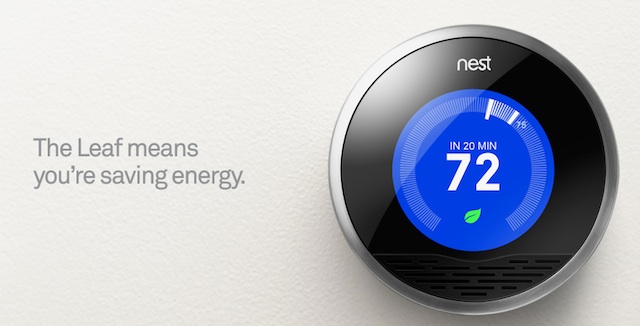An intelligent thermostat seems like an odd project for the minds behind Apple’s iconic iPod, but in a strange way, the iPod folks may just be the perfect team to revolutionize home heating.
The project is the Nest Learning Thermostat, a Wi-Fi connected thermostat that learns your heating preferences and optimizes your home’s temperature to save energy. The brains behind it are Tony Fadell, former SVP of Apple’s iPod group, and Matt Rogers, former lead engineer of iPod software. The two are the founders of Nest Labs.
At first glance, the duo’s Apple heritage is plain to see in the Nest. The device’s design is simple and elegant, sporting a metal outer ring that lets you control the temperature (and which also resembles the original iPod’s mechanical click wheel), and an internal display that changes depending on what you’re trying to do. When it’s warming up your house, for example, it sports a nice toasty red. It also sports a leaf when you’re saving energy (usually by lowering the temperature).
But the Nest has brains as well as beauty. The thermostat learns your heating routine, and after about a week it will be able to automatically adjust your home’s temperature without much input on your part. “It never stops learning,” the company states (somewhat ominously) in its promotional video below.
The Nest is powered by six sensors that track things like the temperature (obviously), humidity, motion, and ambient light. The sensors allow the device to determine when you’re home, which makes it smarter than other thermostats that just rely on a time schedule. Multiple nests can also communicate with each other — so when you come home, your upstairs Nest could start to warm up your bedrooms.
Given the way the Nest optimizes your home’s temperature, the company says you could save around $173 a year in heating costs. With those figures, the Nest would more than pay for itself within a year-and-a-half.
Naturally, there’s also an iPhone app for the Nest that lets you remotely control the temperature and manage other settings. The company says an Android app is in the works. You can also manage all of your Nest devices online at the company’s website.
The Nest will cost $250 — much less than other smart thermostats on the market — and will be available in major retail stores like Best Buy. The company says you should be able to install it yourself in under 30 minutes, but the less tech-savvy may want to hire some help.
[youtube=http://www.youtube.com/watch?v=QCJ1PnVlzIE&w=640&h=360]


